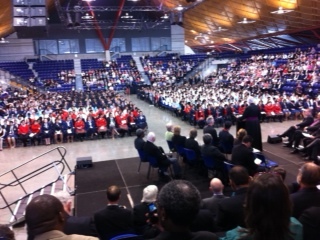Continuing Indaba renewed its mandate today in the ACC. The full report is on the Anglican Communion website
I was part of the summing up – since I am Convenor of the Reference Group for Continuing Indaba. This is what I said:
I was in Rotorua on Sunday. When you preach, you listen to yourself. I heard myself being very passionate about the life of our Anglican Communion. I really believe in what Archbishop Rowan said last night – that we aspire to be “both catholic and orthodox and consensual, working in freedom, mutual respect and mutual restraint; without jeopardising the important local autonomy of our churches.”
He also talked about convergence – growing closer. I sometimes talk about coherence – which is sticking together. And we all talk of the particular aspiration to Communion where we grow closer to God as we grow closer to one another and vice versa.
You cannot be a family just by saying that you are. You have to do things – place yourself in situations in which the Spirit can move and in which you can be challenged and changed. I believe that miracles of grace begin when we place ourselves in obedience where we are called to be – in places where we can build the relationships which create family and Communion
Indaba – as Phil has said – is not a programme or project. It is a movement and a way of being the church – God’s church – our Anglican Communion. If I was French I might call it ‘un saveur’ – an aroma. It is honest conversation – honest conversation in the context of our shared faith – which takes seriously our local contexts.
We have learnt much – in the Communion we have learnt that the problems and difficulties which we experience between provinces across the world are problems and difficulties which we also experience within our provinces. What is experienced within a Province reverberates in the wider Communion – and what is experienced in the wider Communion reverberates locally. And there is something more. As we have been experiencing in the life of the church here in New Zealand, history and the legacy of history – particularly bad and painful history – can shape the way in which we respond to one another. We may not even be aware of that – but we need to become aware and to talk about it.
We believe that the next part of the journey of Continuing Indaba must honour the whole of our relating in our provinces and between our provinces, We need honest conversation – in Indaba – within each of our Provinces but always with an engagement, an involvement and support from the rest of the family, the rest of the Communion.



















